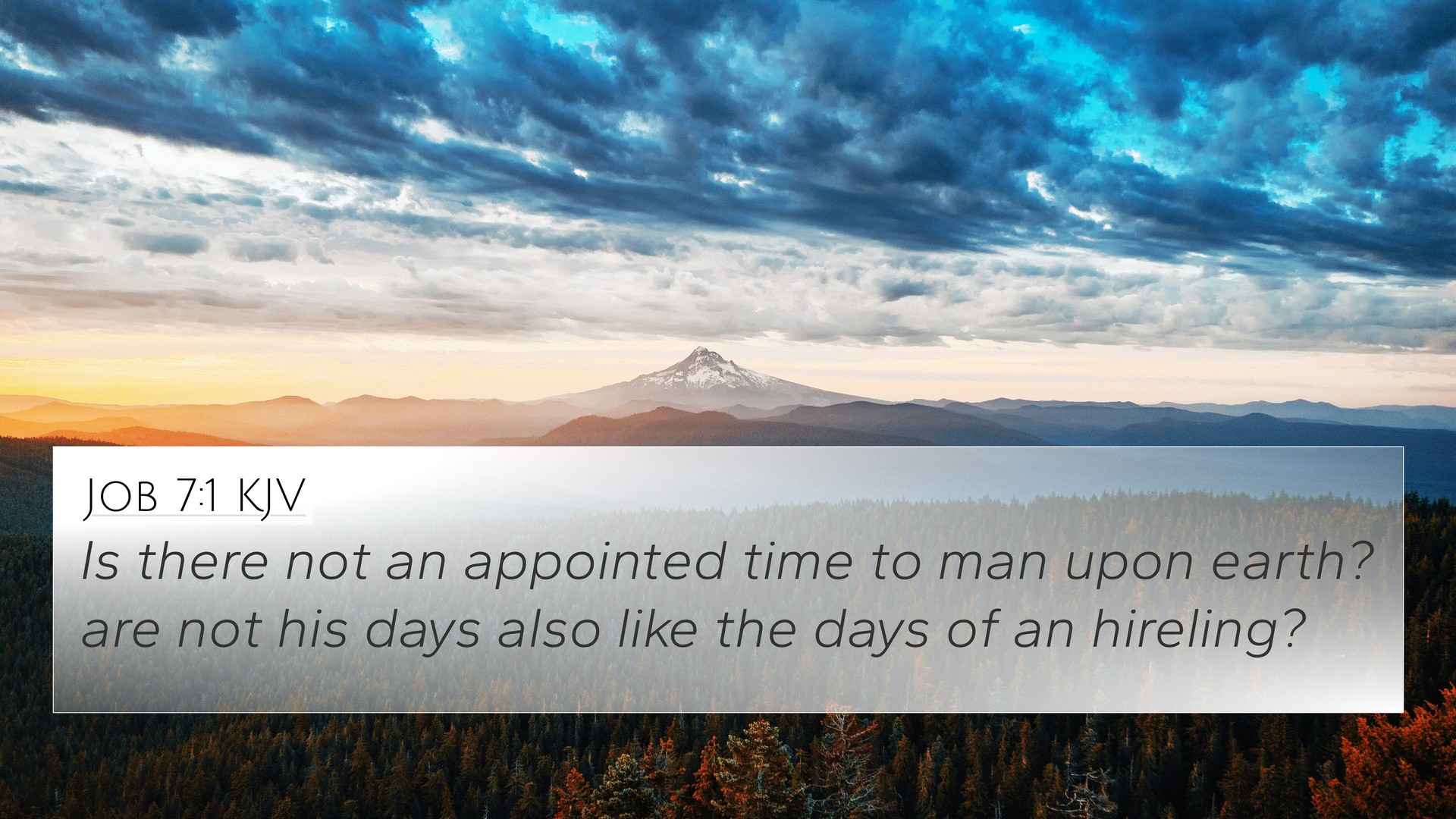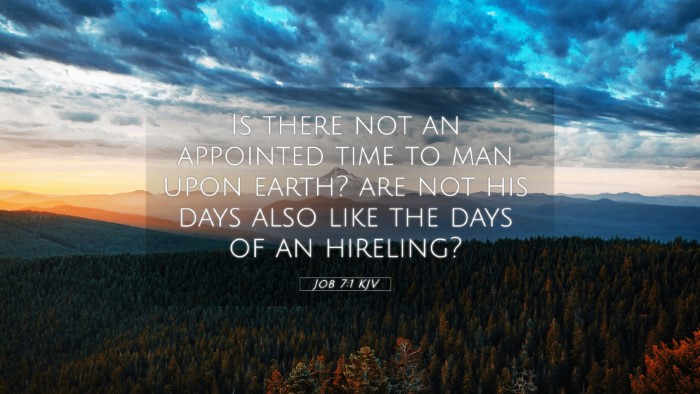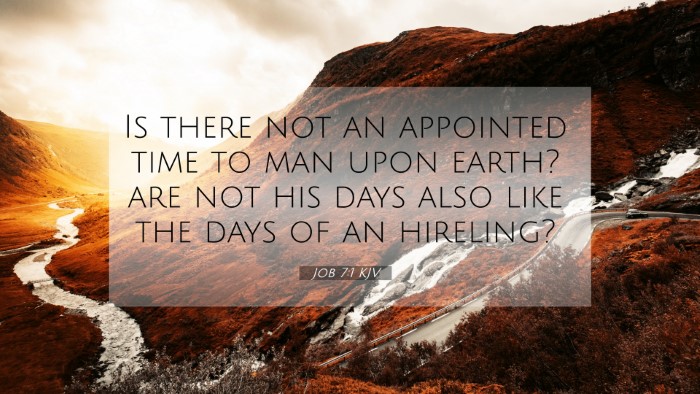Old Testament
Genesis Exodus Leviticus Numbers Deuteronomy Joshua Judges Ruth 1 Samuel 2 Samuel 1 Kings 2 Kings 1 Chronicles 2 Chronicles Ezra Nehemiah Esther Job Psalms Proverbs Ecclesiastes Song of Solomon Isaiah Jeremiah Lamentations Ezekiel Daniel Hosea Joel Amos Obadiah Jonah Micah Nahum Habakkuk Zephaniah Haggai Zechariah MalachiJob 7:1 Similar Verses
Job 7:1 Cross References
Is there not an appointed time to man upon earth? are not his days also like the days of an hireling?
Uncover the Rich Themes and Topics of This Bible Verse
Listed below are the Bible themes associated with Job 7:1. We invite you to explore each theme to gain deeper insights into the Scriptures.
Job 7:1 Cross Reference Verses
This section features a detailed cross-reference designed to enrich your understanding of the Scriptures. Below, you will find carefully selected verses that echo the themes and teachings related to Job 7:1 KJV. Click on any image to explore detailed analyses of related Bible verses and uncover deeper theological insights.

Psalms 39:4 (KJV) »
LORD, make me to know mine end, and the measure of my days, what it is: that I may know how frail I am.
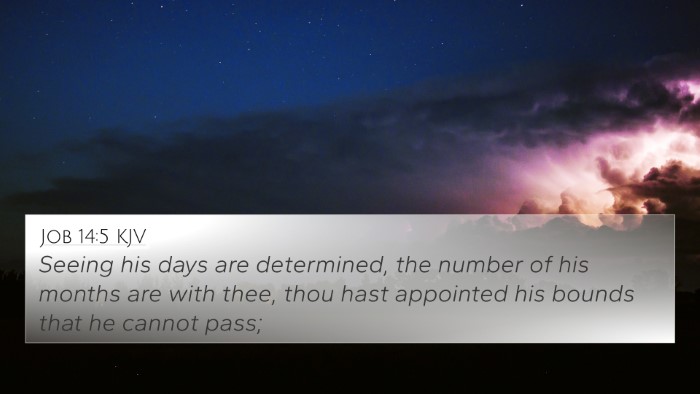
Job 14:5 (KJV) »
Seeing his days are determined, the number of his months are with thee, thou hast appointed his bounds that he cannot pass;

Job 14:13 (KJV) »
O that thou wouldest hide me in the grave, that thou wouldest keep me secret, until thy wrath be past, that thou wouldest appoint me a set time, and remember me!
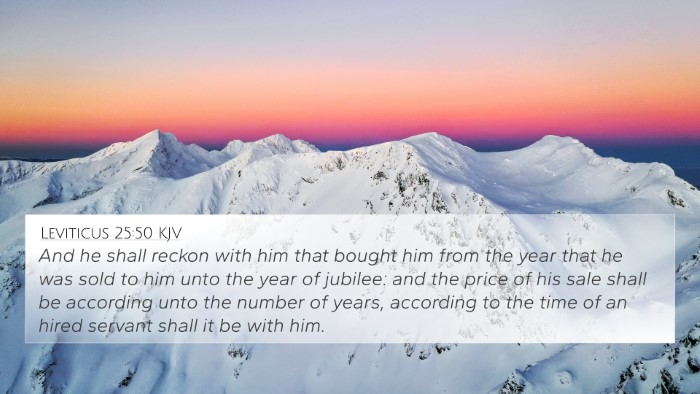
Leviticus 25:50 (KJV) »
And he shall reckon with him that bought him from the year that he was sold to him unto the year of jubilee: and the price of his sale shall be according unto the number of years, according to the time of an hired servant shall it be with him.

Matthew 20:1 (KJV) »
For the kingdom of heaven is like unto a man that is an householder, which went out early in the morning to hire labourers into his vineyard.

Isaiah 21:16 (KJV) »
For thus hath the LORD said unto me, Within a year, according to the years of an hireling, and all the glory of Kedar shall fail:

Isaiah 40:2 (KJV) »
Speak ye comfortably to Jerusalem, and cry unto her, that her warfare is accomplished, that her iniquity is pardoned: for she hath received of the LORD's hand double for all her sins.

Ecclesiastes 8:8 (KJV) »
There is no man that hath power over the spirit to retain the spirit; neither hath he power in the day of death: and there is no discharge in that war; neither shall wickedness deliver those that are given to it.

Deuteronomy 15:18 (KJV) »
It shall not seem hard unto thee, when thou sendest him away free from thee; for he hath been worth a double hired servant to thee, in serving thee six years: and the LORD thy God shall bless thee in all that thou doest.

John 11:9 (KJV) »
Jesus answered, Are there not twelve hours in the day? If any man walk in the day, he stumbleth not, because he seeth the light of this world.
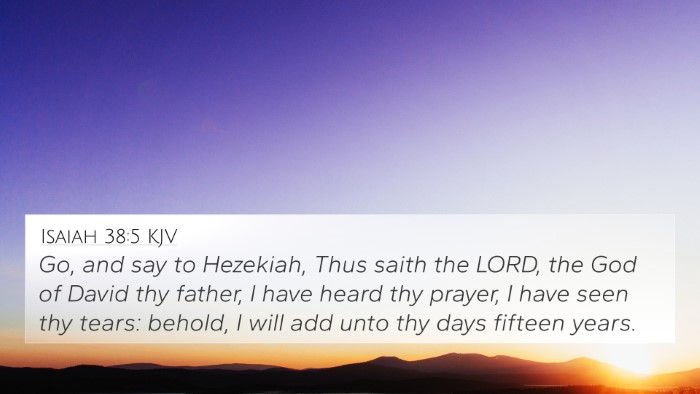
Isaiah 38:5 (KJV) »
Go, and say to Hezekiah, Thus saith the LORD, the God of David thy father, I have heard thy prayer, I have seen thy tears: behold, I will add unto thy days fifteen years.
Job 7:1 Verse Analysis and Similar Verses
Understanding Job 7:1
Job 7:1 states: "Is there not an appointed time to man upon earth? are not his days also like the days of an hireling?" This verse marks a poignant moment in Job's discourse as he reflects on human suffering and the brevity of life. Below is a summarized interpretation of its meaning, drawing from public domain commentaries by notable scholars.
Verse Overview
In this verse, Job draws a comparison between human life and the work of a hired servant. He questions the purpose of human existence, suggesting that like a worker who is bound by a contract, human beings have a set time on earth, bounded by the inevitability of suffering and mortality.
Commentary Insights
-
Matthew Henry:
Henry emphasizes the struggles of human life, likening it to that of a laborer who toils for a temporary reward. He highlights Job's acknowledgment of the oppressive nature of his current state, paralleling the irritation that arises from being overworked without due compensation.
-
Albert Barnes:
Barnes discusses the notion of time in the life of man, comparing it to that of a hireling who awaits the end of a day's labor. He underscores the finiteness of life, suggesting that Job’s lamentation reflects both his personal suffering and the universal condition of humanity.
-
Adam Clarke:
Clarke elaborates on the metaphor of the hireling, indicating that just as the laborer looks forward to the end of his work, so too do humans desire the end of their tribulations. Clarke also accentuates that Job's questioning hints at a deeper theological inquiry into the nature of God's justice.
Biblical Cross-References
Job 7:1 offers profound connections to various themes throughout Scripture. Here are some key cross-references that illuminate its meaning:
- Ecclesiastes 3:2: "A time to be born and a time to die; a time to plant, and a time to pluck up that which is planted." This verse resonates with the concept of life having designated periods.
- Psalms 39:4-5: "Lord, make me to know mine end, and the measure of my days, what it is; that I may know how frail I am." A plea for understanding life’s brevity similar to Job's lament.
- James 4:14: "For what is your life? It is even a vapor, that appeareth for a little time, and then vanisheth away." This New Testament reference echoes the transient nature of human existence.
- Matthew 20:1-16: The Parable of the Workers in the Vineyard reflects themes of labor, reward, and the divine perspective on human toil.
- 1 Peter 1:24: "For all flesh is as grass, and all the glory of man as the flower of grass." A reminder of the fleeting nature of human life.
- Job 14:1-2: "Man that is born of a woman is of few days and full of trouble. He cometh forth like a flower, and is cut down." This passage reinforces Job's thematic concerns about the human condition.
- Romans 8:18: "For I reckon that the sufferings of this present time are not worthy to be compared with the glory which shall be revealed in us." This provides a theological perspective on suffering, tying back to Job's situation.
- John 9:4: "I must work the works of him that sent me, while it is day: the night cometh, when no man can work." This reflects on the urgency and limitations of human existence.
- Philippians 4:12-13: The apostle Paul speaks of learning to be content in both abundance and want, connecting to the struggle of human existence that Job faces.
- Isaiah 40:6-8: “All flesh is grass, and all the goodliness thereof is as the flower of the field.” This emphasizes the transient nature of life, akin to Job’s considerations.
Thematic Analysis
Job 7:1 can be analyzed within several significant themes found throughout the Bible:
- The Nature of Suffering: Job’s words serve as a profound exploration of the human experience of pain and the desire for understanding amidst suffering.
- The Value of Time: Emphasizes the importance of recognizing the limits of our earthly existence and the significance of how we spend our days.
- Divine Providence: Job’s questioning reflects a struggle to comprehend how a sovereign God interacts with the suffering of His creation.
- Human Existence: The fragility and transience of life is a recurring theme in Scripture, inviting reflection on our mortality.
Conclusion
The exploration of Job 7:1 leads to a deeper understanding of life’s temporary nature and the universal human condition of suffering. By cross-referencing related scriptures, readers are invited into a more profound dialogue on the themes present in Job’s lament, reinforcing the connections between biblical texts and offering tools for further study.
